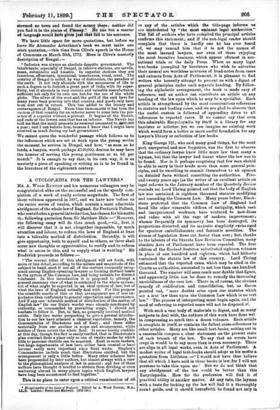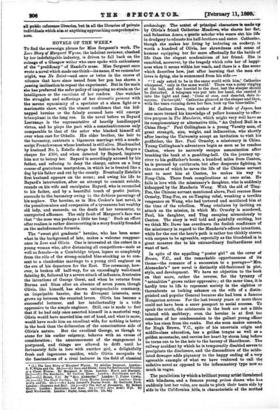A CYCLOPiEDIA FOR THE LAWYERS.*
Mu. A. WOOD RENTON and his numerous colleagues may be congratulated alike on the successful and on the speedy com- pletion, of a work of really serious magnitude. The first of these volumes appeared in 1897, and we have now before us the entire series of twelve, which contain a most admirable abridgment of the whole law of England. Sir Frederick Pollock, who contributes a general introduction, has chosen for his motto tit.: following quotation from Sir Matthew Hale :—" However, the following essay will do thus much good,—viz., first, it will disoover that it is not altogether impossible, by much attention and labour, to reduce the laws of England at least into a tolerable method of distribution. Secondly, it will give opportunity, both to myself and to others, as there shall occur new thoughts or opportunities, to rectify and to reform what is amiss in this, and to supply what is wanting." Sir Frederick proceeds as follows :- " The several titles of this abridgMent will set forth, with more or less detail, according to the nature and magnitude of the subject in hand, most if not all of the matters commonly recog- nised among English-speaking lawyers as forming distinct heads in the system of the Common Law, and being suitable for distinct treatment. In this introduction it is proposed to attempt a general summary view of what is contained in the whole system ; not of what might be expected in an ideal system of law, but of what the laws of England actually deal with. For this purpose the scientific merits of this or that arrangement are of less im- portance than conformity to general expectation and convenience. And if any one' tolerable method of distribution of the matter of English law' (to use Hale's words) were already sanctioned by authority, or commended by prevailing usage, I should not hesitate to follow it. But, in fact, no generally received method exists. Only two works purporting 'to give a general introduc- tion to our law have attained a classical reputation, namely, the Commentaries of Blackstone and of Kent; and these differ materially from one another in scope and arrangement, while neither of them covers the whole field. It seems hardly credible at this day, though the fact is easily verified, that in Blackstone's plan contract finds a place only as one of twelve modes by which title to personal chattels can be acquired. Kent is more modern, but large departments of law have either been created or have become vastly more important since Kent wrote. Stephen's Commentaries include mueh that Blackstone omitted, but the arrangement is only a little better. Many other schemes have been propounded by later authors, but almost always with a view to the philosophical analysis of law in general ; and few of those authors have thought it needful to abstain from dividing or even scattering abroad in many places topics which English lawyers have long been accustomed to find together."
This is no place to enter upon a critical examination of all
• Sncyclopzdia of the Laws of England. Edited by A. Wood Renton, M.A., LL.B. London Sweet and Maxwell. lt12 12e.1 or any of the artioles which the title-page informs us are contributed by " the most eminent legal authorities." The list of authors who have compiled the principal articles confirms this statement; and if the non-legal reader should complain that there is hardly one he has ever heard of, we may remind him that it is not the names of the most learned lawyers, nor even of those enjoying the most lucrative business, which appear oftenest in sen- sational trials or the daily Press. When so many legal text-books (compiled by barristers who wish to advertise their names) are worthless mixtures of head-notes from cases and extracts from Acts of Parliament, it is pleasant to find writers who honestly attempt to present us with a digest of general principles under each separate beading. By follow- ing the alphabetic arrangement, the book is made easy of reference, and an author can contribute an article on any heading of the law upon which he may be a specialist. Each article is strengthened by the most conscientious references to statutes and leading cases, and we are glad to observe that the useful custom is followed of appending dates to all references to reported cases. If we cannot say that even this admirable Encyclopaedia by itself is a library for any barrister or solicitor, yet we can imagine no existing work which would form a better or more useful foundation for any lawyer's library or collection of law books.
King George Pr., who said many good things, for the most part unreported and now forgotten, was the first to observe that the ordinary lawyer knew little more law than many a layman, but that the lawyer had learnt where the law was to be found. Nor is it perhaps surprising that few men should be able to carry in their heads more than some general prin- ciples, and be unwilling to commit themselves to an opinion on detailed facts without consulting the authorities. Five- and-twenty years ago (as the writer of an excellent article on legal reforms in the January number of the Quarterly Review reminds us) Lord Thring pointed out that the body of English law was contained in eighteen thousand statutes modifying and amending the Common Law. Many years before, Black- stone protested that the Common Law of England had fared like other venerable edifices of antiquity, which rash and inexperienced workmen have ventured to new-dress and refine with all the rage of modern improvement ; whence frequently its symmetry has been destroyed, its proportions distorted, and its majestic simplicity excha nged for specious embellishments and fantastic novelties. The stream of legislation flows out faster than ever; but, thanks to the labours of the Statute Law Revision Committee, many obsolete Acts of Parliament have been repealed. The first edition of the Revised Statutes substituted eighteen volumes in place of one hundred and eighteen, which had hitherto contained the statute law of this country. Lord Thring estimated that the reported cases, which may be cited in the Courts as authorities, amounted to not less than one hundred thousand. The number will soon reach near double that figure, and apparently little can be done to remedy the increasing unwieldiness of the case law. There is, of course, the obvious remedy of codification and consolidation, but, as Bacon pointed out, " more doubts arise upon our statutes which are a text law than upon the Common Law which is no text law." The process of interpreting must begin again, and the need of referring to reported cases will not be disposed oF.
With such a vast body of materials to digest, and so many subjects to deal with, the authors of this work have done wel in compressing so much into a dozen volumes. Each article is complete in itself, or contains the fullest cross-references to other articles. Many are like small text-books, setting out in a reasonable compass a clear statement on the present state of each branch of the law. To say that no errors have crept in would be to say more than is even necessary. There are slips in all legal works, even in Acts of Parliament. A modest writer of legal text-books should adopt as his motto a quotation from Littleton :—" I would not have thee believe that all which I have said in these books is law, for I will not presume to take this upon me." But we do not think that any abridgment of the law could be better than this Encyclopaedia. How far the profession will find it of practical utility is another matter, At any rate, the layman with a taste for looking up the law will find it a thoroughly sound guide, and it should henceforth be found not only in
all public reference libraries, but in all the libraries of private individuals which alin at anything approaching comprehensive- ness.







































 Previous page
Previous page